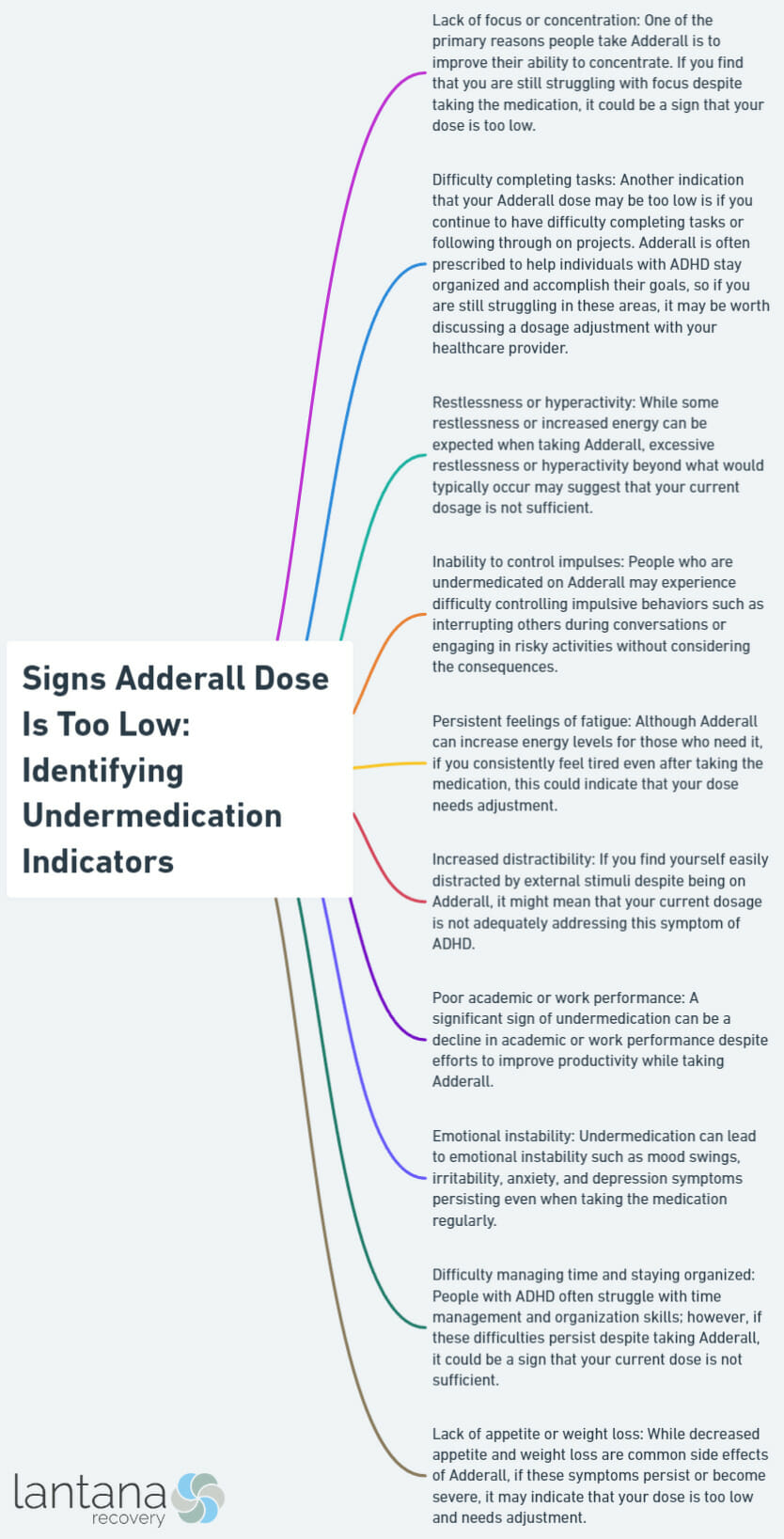Understanding the appropriate dosage of medication is crucial for its effectiveness in treating a specific condition. This holds true for Adderall, a commonly prescribed medication for attention deficit hyperactivity disorder (ADHD). Determining the proper dosage of Adderall is vital to ensure its therapeutic benefits and minimize the risk of potential side effects. However, undermedication, or taking a dose that is too low, can result in inadequate symptom management and impaired daily functioning. Recognizing the signs of undermedication is crucial for individuals taking Adderall to optimize their treatment outcomes.
Some indicators of undermedication include a lack of focus and attention, persistent fatigue and sleepiness, inability to control impulsive behavior, poor academic or work performance, persistent hyperactivity, and restlessness and irritability.
Finding the right dosage of Adderall is critical for addressing ADHD symptoms effectively. It requires careful evaluation of an individual’s response to the medication, considering factors such as weight, age, metabolism, and overall health. Identifying if the Adderall dose is too low can be done by evaluating the impact on symptoms and consulting with a healthcare professional.
Optimizing Adderall dosage involves maintaining open communication with the healthcare provider, regularly assessing symptom improvement, and making dosage adjustments under medical supervision. These steps will help individuals find the appropriate Adderall dosage that provides optimal symptom control and improves their overall quality of life.
Understanding Adderall Medication
Understanding Adderall Medication maximizes benefits and minimizes risks. Close collaboration with a healthcare provider is important to determine the right dosage, monitor side effects, and assess effectiveness regularly. By having a thorough understanding of Adderall, individuals can make informed decisions and achieve the best outcomes in their ADHD treatment.

What is the Proper Dosage for Adderall?
When determining the proper dosage for Adderall, it is important to consult a healthcare professional for personalized guidance. Consider factors such as weight, medical condition, tolerance, response, and side effects. What is the Proper Dosage for Adderall?
The dosage for children typically starts at 5-10mg per day, while adults may start at 10-20mg per day. Higher doses may be required for more severe symptoms. Regular monitoring and dosage adjustments may be necessary due to tolerance. Individual response to Adderall varies, with some requiring lower doses and others needing higher doses. Side effects indicate a dosage that is too high, so finding a balance is important. Follow the prescribed dosage and healthcare professional’s instructions. Regular follow-ups and open communication are necessary for monitoring Adderall‘s effectiveness and safety.
During the 1990s development of Adderall, extensive research determined the safe and effective dosage range through clinical trials. Ongoing research continues to refine our understanding of the proper dosage for Adderall.
What Factors Influence Adderall Dosage?
The appropriate dosage of Adderall for ADHD is influenced by various factors. These factors determine the suitable dosage for each individual. Important considerations for determining Adderall dosage include body weight, age, severity of symptoms, individual response, other medical conditions, concurrent medications, tolerance and side effects, and regular monitoring.
The dosage is typically based on body weight, with a recommended range of 0.5-1.5 mg per kilogram of body weight per day. Different dosages may be required for children and adults, and the required dosage can be affected by the severity of symptoms.
It is important to take into account the individual’s response to the medication, as well as any underlying medical conditions or concurrent medications. Over time, adjustments to the dosage may be necessary due to tolerance and side effects. It is essential to regularly monitor symptoms and side effects to assess the effectiveness of the treatment.
Throughout the treatment process, it is crucial to consult with a healthcare professional for personalized guidance.

Signs of Undermedication
If your Adderall dosage is falling short, a range of indicators can reveal that you might be undermedicated. Let’s take a closer look at the signs of undermedication, including a lack of focus and attention, persistent fatigue and sleepiness, an inability to control impulsive behavior, poor academic or work performance, persistent hyperactivity, and restlessness and irritability. These telltale signs will help you identify if your current dosage isn’t meeting your needs.
Lack of Focus and Attention
A lack of focus and attention is a common symptom of undermedication with Adderall. It’s important to identify and address this issue to optimize the dosage and ensure effectiveness.
One way to evaluate lack of focus and attention is by assessing its impact on daily activities. Difficulty concentrating, maintaining attention, and staying engaged in conversations or activities could indicate a low dosage of Adderall.
Consulting with a healthcare professional is essential to determine if the dosage needs adjustment. They can evaluate symptoms and provide guidance on the appropriate dosage.
To optimize Adderall dosage and address lack of focus and attention, maintain communication with your healthcare provider. Regularly assess symptom improvement and discuss any concerns or changes. Adjust the dosage under medical supervision for safety and effectiveness.
Sarah struggled with a lack of focus and attention for years, affecting her work performance and task completion. After consulting her doctor, she was prescribed Adderall to address this issue. However, she initially saw no improvement. Through regular communication and dosage adjustments under medical supervision, Sarah found the right balance and optimized her Adderall dosage. This significantly improved her ability to focus and pay attention to tasks, resulting in better performance at work and a sense of relief.
Persistent Fatigue and Sleepiness
Persistent fatigue and sleepiness are common signs of undermedication with Adderall. It is important to be aware of these persistent fatigue and sleepiness symptoms and address them appropriately. Here are some key points to consider:
1. Fatigue: Consistently feeling tired and lacking energy, even after a full night’s sleep, may indicate a low Adderall dosage. Persistent fatigue can greatly impact daily functioning and overall well-being.
2. Sleepiness: Experiencing excessive sleepiness throughout the day, despite getting enough rest, can result from undermedication. Difficulty staying awake and focused can negatively affect productivity and daily activities.
To ensure optimal treatment with Adderall, it is crucial to discuss these persistent fatigue and sleepiness symptoms with your healthcare provider. They can assess whether your dosage needs adjustment or if other factors contribute to your persistent fatigue and sleepiness.
Pro-tip: Keep a journal to track symptoms, including energy levels, sleep patterns, and other relevant information about your well-being. This can provide valuable insights for your healthcare provider and facilitate an accurate assessment of your medication needs.
Fact: Various cross-sectional, clinical, and population studies have documented insomnia prevalence in adults with ADHD, with rates ranging from 43% to 80%.

Inability to Control Impulsive Behavior
Inadequate dosage of Adderall can lead to an inability to control impulsive behavior, which is a significant issue faced by individuals taking this medication. To ensure the effectiveness of the medication and avoid potential negative consequences, it is crucial to promptly address this concern.
There are various signs that indicate the inability to control impulsive behavior. These signs may include struggling to resist sudden urges, acting impulsively without considering the consequences, and experiencing difficulty in maintaining self-control. Such impulsive behavior can result in impulsive spending, engaging in risky behaviors, or making thoughtless decisions.
In order to effectively address this issue, it is essential to evaluate the impact of the medication on these symptoms. If the inability to control impulsive behavior persists or worsens, it is highly recommended to consult with a healthcare professional. They can assess the current dosage and make any necessary adjustments.
Tips for optimizing the Adderall dosage to address the inability to control impulsive behavior include maintaining open communication with the healthcare provider and regularly assessing the improvement of symptoms. Under the supervision of a medical professional, the dosage can be adjusted to better manage impulsive behavior.
Poor Academic or Work Performance
Poor academic or work performance can be a sign of undermedication when taking Adderall. Addressing this issue is crucial for optimal performance and productivity. Here are indicators of poor academic or work performance:
- Lack of focus and attention: Difficulty concentrating on tasks or staying engaged.
- Persistent fatigue and sleepiness: Feeling tired throughout the day, struggling to stay awake.
- Inability to control impulsive behavior: Difficulty resisting urges or acting without considering consequences.
- Poor academic or work performance: Decreased productivity and falling behind in assignments.
- Persistent hyperactivity: Excessive restlessness and constantly being on the move.
- Restlessness and irritability: Feeling agitated and unable to calm down.
Recognizing these signs is crucial for identifying the need for adjustments in Adderall dosage. If you or someone you know is experiencing these symptoms, it is recommended to:
- Evaluate symptom impact: Assess whether there has been any improvement in focus, productivity, and performance since starting or adjusting the medication.
- Consult with a healthcare professional: Discuss concerns and experiences with a healthcare provider to determine if dosage adjustment is necessary.
Remember, finding the right dosage of Adderall is important for effectively managing symptoms and optimizing academic or work performance. Regular communication with a healthcare provider, assessing symptom improvement, and adjusting the dosage under medical supervision are essential for desired results.
Is Concerta Addictive? Read our article on the risks and dependency potential of Concerta to find out!
Persistent Hyperactivity
Persistent hyperactivity is a key indicator of inadequate medication for individuals who are prescribed Adderall. It is distinguished by excessive physical movement, restlessness, and the inability to remain still for extended periods. This symptom greatly hampers a person’s ability to concentrate, focus, and effectively participate in tasks that necessitate sustained attention.
Recognizing persistent hyperactivity as a clear sign of undermedication is of utmost importance since it suggests that the current Adderall dosage may not be sufficient in properly managing symptoms of ADHD. Individuals who are undermedicated may find it challenging to control their impulses and frequently display impulsive behaviors. This can have adverse effects on their academic or professional performance, leading to frustration and irritability.
To ascertain whether persistent hyperactivity is a result of undermedication, it is vital to assess the impact of the current Adderall dosage on symptoms. If hyperactivity persists despite adhering to the prescribed medication regimen, it may be necessary to seek guidance from a healthcare professional for further evaluation. They can evaluate the dosage and consider making adjustments under medical supervision in order to optimize its effectiveness.
Fact: Attention deficit hyperactivity disorder (ADHD) affects approximately 5% to 10% of children and 2% to 5% of adults worldwide. Proper management of medication, which includes determining the appropriate dose of Adderall, can dramatically enhance the quality of life for individuals with ADHD.
Restlessness and Irritability
Restlessness and irritability are two common signs that may indicate undermedication with Adderall. It is crucial to be aware of these symptoms in order to ensure the appropriate dosage for optimal management of your symptoms.
Restlessness can manifest as a strong urge to move, an inability to stay still, fidgeting, or a general sense of unease. If you experience restlessness, it could be a sign that your current dose of Adderall is too low.
Irritability, on the other hand, refers to easily becoming annoyed, being short-tempered, or having anger outbursts without a specific trigger. This type of irritability can be caused by undermedication with Adderall and can negatively impact your relationships and overall well-being.
To address restlessness and irritability, it is important to follow these tips:
-
Discuss your symptoms with your healthcare provider: If you continue to experience restlessness and irritability, it is advisable to consult with your healthcare provider. They can evaluate your current Adderall dosage and make any necessary adjustments based on your symptoms.
-
Openly communicate with your healthcare provider: Regularly sharing any changes or concerns with your healthcare provider is crucial. This will enable them to guide you effectively in managing your restlessness and irritability.
-
Regularly assess your symptom improvement: Pay attention to any changes in your symptoms and evaluate whether they have improved or worsened with your current dosage. Keeping a journal or notes to track your progress can be helpful, and sharing this information with your healthcare provider can provide valuable insights.
-
Adjust your dosage under medical supervision: Never make any adjustments to your Adderall dosage on your own. It is vital to do this under the supervision and guidance of your healthcare provider to ensure both your safety and the effectiveness of the medication.
By being mindful of your restlessness and irritability and working closely with your healthcare provider, you can optimize your Adderall dosage for better management of your symptoms and overall well-being.

Why is Finding the Right Dosage Important?
Finding the right dosage is crucial for medication, including Adderall. The correct dosage is important for effective symptom management of attention deficit hyperactivity disorder (ADHD), as well as for minimizing side effects.
“Despite their increasing use and documented efficacy, CNS stimulant pharmacotherapy has remained controversial due to safety concerns, including the potential for abuse and adverse cardiovascular side effects.” (Meta-analysis of increased heart rate and blood pressure associated with CNS stimulant treatment of ADHD in adults, Mick et al., 2013)
Each person’s response to medication is different, so the optimal dosage can vary. Working with a healthcare professional is essential to finding the right dosage and achieving long-term treatment success.
Why is finding the right dosage important? It is because the proper dosage is crucial for effective treatment and minimizing side effects in individuals with ADHD. By working closely with a healthcare professional, patients can find their optimal dosage and experience successful long-term treatment outcomes.
How to Identify if Adderall Dose is Too Low?
Is your Adderall dose delivering the desired results? Let’s uncover the telltale signs of undermedication and explore how to identify if your Adderall dose is too low. We’ll examine the impact on symptoms and provide insights into consulting with a healthcare professional. Stay tuned to gain valuable insights that can help optimize your medication regimen and enhance your overall well-being.
Evaluating the Impact on Symptoms
When evaluating the impact of symptoms while taking Adderall, consider the following factors:
– Focus and attention: Pay attention to improved concentration. – Fatigue and sleepiness: Assess increased alertness and energy throughout the day. – Impulsive behavior: Evaluate improved control over impulsive actions and decision-making. – Academic or work performance: Keep track of productivity and performance in academic or professional pursuits. – Hyperactivity: Notice if excessive restlessness or hyperactivity has diminished. – Restlessness and irritability: Monitor changes in overall mood and restlessness.
Regularly assess these symptoms to determine if the current dosage of Adderall is effectively managing your condition. If there is little improvement in any of these areas, it may indicate that your dose is too low.
To ensure the right dosage, consider the following suggestions:
– Maintain open communication with your healthcare provider to discuss concerns or observations about your symptoms. – Regularly assess symptom improvement to track progress and identify any areas of concern. – Work closely with your healthcare provider to adjust the dosage under their supervision, considering their expert guidance and your specific needs.
Consulting with Healthcare Professional
Consulting with a healthcare professional is crucial when determining the proper dosage for Adderall. It is important to consult with a healthcare professional who can assess your individual needs and provide you with informed decisions about your medication.
During the consultation, the healthcare professional will take into consideration factors such as your age, weight, medical history, and how you have responded to previous treatments. They will also review any other medications you may be taking, as certain drug interactions can impact the effectiveness and safety of Adderall.
Openly communicate with your healthcare provider during the consultation, discussing any concerns or side effects you may be experiencing, as well as any changes in symptoms. Your provider has the ability to adjust your dosage based on your specific needs and circumstances.
Regular follow-up appointments are essential to ensure that the prescribed dosage is effective for you and provides optimal relief from symptoms. These appointments allow your healthcare provider to assess your symptom improvement and make any necessary adjustments to your dosage while under medical supervision.
Remember that personalized advice and guidance regarding Adderall dosage can only be provided by a healthcare professional. Consulting with them ensures that you receive appropriate treatment and support for your condition.

Tips for Optimizing Adderall Dosage
Want to make the most of your Adderall dosage? Look no further! In this section, we’ll dive into some invaluable tips that can help optimize your Adderall dosage. From maintaining clear communication with your healthcare provider to regularly assessing symptom improvement, and making dosage adjustments under medical supervision, we’ve got you covered. Get ready to take control of your medication journey and achieve optimal results!
Maintaining Communication with Healthcare Provider
Maintaining open communication with your healthcare provider is crucial when taking Adderall to ensure appropriate and effective dosage. Here are steps to help you maintain communication:
1. Schedule regular check-ups: Visit your healthcare provider regularly to discuss progress, concerns, and potential dosage adjustments.
2. Share symptoms: Be open and honest about changes in symptoms, both positive and negative, to assess dosage effectiveness.
3. Mention side effects: Inform your healthcare provider about any side effects. They can determine if adjustments to dosage are necessary.
4. Discuss lifestyle factors: Talk to your healthcare provider about changes or plans for changes in diet, exercise, or sleep patterns that could impact dosage effectiveness.
5. Ask questions: Don’t hesitate to ask your healthcare provider any questions or express concerns about treatment. They are there to support and guide you.
6. Follow their advice: Follow your healthcare provider’s instructions regarding medication dosage. If adjustments are recommended, report any changes noticed.
Maintaining open communication with your healthcare provider is essential for optimizing your Adderall dosage and achieving the best possible results from your medication.
Regularly Assessing Symptom Improvement
Regularly assessing symptom improvement is crucial when taking Adderall medication. By consistently monitoring symptoms, you can determine if the current dosage effectively manages your condition or if adjustments are needed.
Actively observing how symptoms change over time is essential. Keep track of factors like focus, attention, impulsivity, performance, hyperactivity, restlessness, and irritability. Regularly assessing these symptoms helps you understand the impact of the medication on your daily life.
Consulting with a healthcare professional during this process is recommended. They can provide guidance in evaluating symptom improvement. Based on their assessment and your feedback, they can determine if any dosage adjustments are necessary for optimal results.
A true story that highlights the importance of regularly assessing symptom improvement involves Sara, a young adult with ADHD. Initially, Adderall improved her focus and reduced impulsivity. However, after a few weeks, she noticed a decline in symptom improvement.
After being prescribed Adderall 7.5 mg, Sara decided to consistently assess her symptoms and document her experiences. After discussing her concerns with her healthcare provider, they adjusted her dosage. With the new dosage, Sara noticed significant improvements in attention and impulse control.
Regularly assessing symptom improvement not only determines the right Adderall dosage but also ensures optimal treatment for individuals like Sara.
Adjusting Dosage Under Medical Supervision
Adjusting dosage for Adderall should always be done under medical supervision. Here are the steps to follow:
1. Consult your healthcare provider: Before changing your Adderall dosage, discuss it with your healthcare provider. They will assess your symptoms and determine if an adjustment is necessary.
2. Maintain open communication: Keep your healthcare provider informed about changes in your symptoms or side effects you may experience during the dosage adjustment process.
3. Regularly assess symptom improvement: Pay attention to how your symptoms respond to the current dosage. If you don’t see the desired improvement, it may indicate the need for an adjustment.
4. Follow medical guidance: If an adjustment is necessary, follow your healthcare provider’s specific instructions on how to make it, such as gradually increasing or decreasing the dosage.
5. Monitor for side effects: Be vigilant for any potential side effects as you adjust your dosage. Contact your healthcare provider immediately if you experience any new or concerning symptoms.
6. Adhere to prescribed dosage: Once you and your healthcare provider determine the appropriate dosage, strictly follow it. Do not make any further adjustments without consulting them first.
By following these steps and working closely with your healthcare provider, you can safely and effectively adjust your Adderall dosage under medical supervision.
Frequently Asked Questions
Question 1: What are some signs that the Adderall dose is too low?
Answer: Signs that the Adderall dose may be too low include difficulty paying attention or focusing, only getting symptom relief for a brief period, difficulties with impulse control, getting easily distracted, feeling hyperactive or “on the go,” difficulty paying attention and avoiding distractions, and no significant symptom relief after two weeks on medication.
Question 2: How can I tell if my Adderall dose is too low or too high?
Answer: If you experience severe or debilitating side effects that persist after a week, it may be a sign that your Adderall dose is too high. On the other hand, if you are still experiencing ADHD symptoms without significant improvement after two weeks on medication, it may indicate that your Adderall dose is too low.
Question 3: Can genetic differences affect how my body reacts to Adderall?
Answer: Yes, genetic differences can affect how your body responds to Adderall and other ADHD medications. Factors such as genetic variations in drug metabolism enzymes can influence how your body processes and absorbs the medication. This is why it’s important to work with a healthcare professional who can tailor the medication dosage based on your unique circumstances.
Question 4: What role do mental healthcare professionals play in adjusting Adderall dosage?
Answer: Mental healthcare professionals, such as psychiatrists or clinical psychologists at an outpatient clinic, play a crucial role in adjusting Adderall dosage. They have the expertise to assess your symptoms, monitor your response to the medication, and collaborate with you to find the most effective dose with the fewest side effects. It is important to maintain open communication with your mental healthcare professional throughout the process to ensure the best outcomes.
Question 5: Are there specific prescribing guidelines for Adderall dosing?
Answer: Adderall dosing, like ADHD medication dosing in general, is not standardized and can vary from person to person. There are no specific prescribing guidelines that apply to everyone. The dosage should be individualized based on factors such as age, severity of ADHD symptoms, and comorbidities. It is important for healthcare providers to carefully consider these factors when determining the appropriate Adderall dosage.
Question 6: Can I increase my Adderall dosage on my own if I feel it is too low?
Answer: No, you should not increase your Adderall dosage on your own without consulting a healthcare professional. Only a qualified healthcare provider can make dosage adjustments based on your specific needs and response to the medication. It is important to follow their guidance to ensure safe and effective treatment of your ADHD symptoms.









